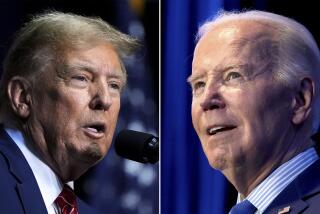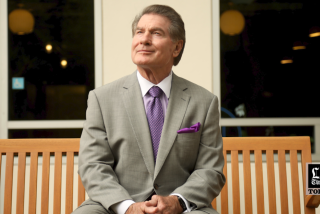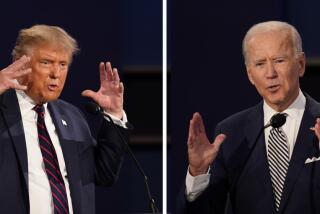Huckabee inches toward Giuliani
Mike Huckabee, the ascendant Republican presidential candidate in Iowa, is enjoying a surge of support across the country -- and Rudolph W. Giuliani seems to be paying the biggest price, a Los Angeles Times/Bloomberg poll has found.
Huckabee has pulled into second place, close behind Giuliani, in the national survey of Republican-leaning voters. The results signal that Huckabee’s candidacy is catching fire beyond Iowa -- where several recent polls have shown him with a slight lead or in a virtual dead heat with Mitt Romney, who long had led in the state where the nomination process officially starts.
FOR THE RECORD:
Poll graphic: A graphic accompanying a Times/Bloomberg poll in Wednesday’s Section A showed incorrect results for one question. Asked, “Regardless of your choice for president, which Democratic candidate says what they believe rather than what voters want to hear?” The correct figures are Sen. Hillary Rodham Clinton 34%, Sen. Barack Obama 27% and former Sen. John Edwards 19%. The percentages for Obama and Edwards were switched. —
In the Times/Bloomberg poll, Huckabee was preferred by 17% of likely GOP voters -- up from 7% in a similar October survey.
Support for Giuliani, the former New York mayor who once enjoyed a commanding lead in national polls, slid 9 percentage points over the last two months -- to 23%.
Support for other GOP candidates remained largely unchanged.
Analysis of the results and interviews with poll respondents show that Huckabee is drawing on conservatives and churchgoers who like his open embrace of religious values -- a powerful faction of the party that is skeptical about Giuliani because of his more liberal views on social issues.
Huckabee, the former governor of Arkansas, “is charismatic and very outspoken about his faith,” said Julie Bricker, a student in College Station, Texas. “I agree with a lot of the points he makes [opposing] abortion and gay rights.”
And as Romney, the former governor of Massachusetts, prepares for a Thursday speech on religious values, an overwhelming majority of the GOP-leaning voters surveyed said their view of him was not influenced by his being Mormon. Thirteen percent said his religious affiliation would make them less likely to vote for him.
Among likely Democratic voters across the nation, the Times/Bloomberg poll found that Sen. Hillary Rodham Clinton of New York has maintained a solid lead, even as polls in Iowa show she remains locked in a tight three-way contest there with Sen. Barack Obama of Illinois and former Sen. John Edwards of North Carolina.
Nationally, Clinton was favored by 45% of those polled; 21% chose Obama, and 11% were for Edwards.
Those figures represent slight increases for Obama and Edwards and a small drop for Clinton since the October survey. But all the changes fall within the poll’s margin of error.
The Jan. 3 presidential caucuses in Iowa have the potential to transform the political dynamics and voter opinion nationally for candidates in both parties. But in the Democratic race, the new national survey underscores that despite the close contest in Iowa, Clinton retains a strong advantage elsewhere in the country.
The poll also illustrates the volatility and unsettled nature of the GOP field.
One measure of its instability: Among the Republican-leaning voters who backed a candidate, 47% said they might vote for someone else. That’s down from 61% in October, but still more than the 37% of Democratic-leaning voters who said they might change their minds.
The survey, conducted under the supervision of Times Poll Director Susan Pinkus, was based on interviews from Friday through Monday of 1,245 registered voters, including 529 who expect to support a Democrat and 428 who expect to support a Republican.
The margin of error was plus or minus 4 percentage points for the Democratic sample and plus or minus 5 percentage points for the GOP group. For the entire group, the margin of error was plus or minus 3 percentage points.
The poll found that candidates are facing an electorate that remains sour about the nation and President Bush. Only 24% think the country is going in the right direction; 35% approve of how Bush is handling his job.
The voters were split on which party would do a better job handling the situation in Iraq: 38% gave the nod to the Democrats, 35% to the Republicans.
In the GOP contest, the signs of Huckabee’s upswing come as competition has intensified in Iowa.
Despite the appeal he is demonstrating outside Iowa, questions remain about whether he can fortify his meager campaign infrastructure to capitalize on a strong showing there.
“His affability and his consolidation of the social conservative voters has propelled him well into the first tier,” said Whit Ayres, a veteran Republican pollster with no ties to any candidate. “He has yet to translate that support into significant financial resources, which anyone in the top tier is going to have to have to fight off attacks.”
The new poll shows that Huckabee still faces other major obstacles to turning positive opinion into political capital. Only 6% of Republican voters named him as the candidate with the best chance of winning the general election; 38% selected Giuliani.
“I wish [Huckabee] could win,” said Nikki Giltner, a retired truck driver in Indiana who backs him. “But I think there are more nonreligious people in our country than religious, so I don’t think he would make it.”
Huckabee has made inroads among conservative voters who have been seen as a tough sell for Giuliani because of his support for abortion rights. Huckabee’s growing support also has undercut the pull that former Sen. Fred Thompson of Tennessee hoped to exert on the party’s right wing.
Among self-described conservatives, Huckabee is running even with Giuliani, with support from 20% of voters -- a big swing from October, when Giuliani drew 34% of conservatives and Huckabee 9%.
Conservative support for Thompson, meanwhile, dropped to 12% in the survey, compared with 19% in October. Support for Romney, who has sought to portray himself as the party’s most committed conservative despite his past support for abortion rights, stayed about the same, at 12%.
Huckabee’s strength is especially evident among regular churchgoers: 23% of those who said they attended religious services at least once a week preferred him, more than double the share he drew in October.
Giuliani and Sen. John McCain (R-Ariz.) each won 14% support from that group. Support for Thompson among these voters dropped to 10%, from 17% in October.
Among Democratic voters, Clinton’s continuing double-digit lead suggests that stepped-up attacks on her by Obama and Edwards in recent candidate debates did not drive away backers nationwide.
Cecelia Holaway, a restaurant worker in Georgia, said she might change her mind about supporting Clinton -- but not because of sniping from her male rivals.
“It’s just because she’s a woman and they feel intimidated by her,” Holaway said.
Although polls in Iowa have shown Obama making gains in the state among the elderly and women -- core pillars of Clinton’s support -- he has not done so nationally.
In the new poll, Clinton continued to build on her strength among the elderly, winning support from 54% of voters over 65 years of age (a 10-point increase since October), compared with 12% for Obama.
Also, more than half of Democratic-leaning women supported Clinton, far outstripping the 20% for Obama.
“The bad news for Clinton is that this nomination is not going to be a sprint -- it will be a marathon,” said Fred Yang, a Democratic pollster unaffiliated with any candidate. “But she is very well prepared to win a marathon too.”
The poll included four hypothetical general-election matchups with Clinton, Obama, Giuliani and Romney. In each case, the Democrat outpolled the Republican -- although in some cases by only a narrow margin.
The widest gap came when voters were asked to choose between Obama and Romney (45% to 33%). The tightest contest was between Clinton and Giuliani (46% to 42%).
Associate polling director Jill Darling contributed to this report.
More to Read
Start your day right
Sign up for Essential California for news, features and recommendations from the L.A. Times and beyond in your inbox six days a week.
You may occasionally receive promotional content from the Los Angeles Times.







